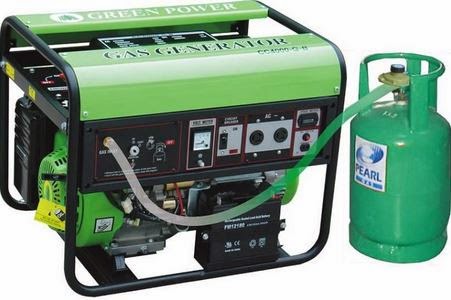By Isaac Chukwuebuka Chibuife
The continued hike in the cost of petrol in recent months, as a result of subsidy removal has forced an increasing number of Nigerians to turn to gas-powered generators as a cheaper alternative.
With President Bola Ahmed Tinubu’s administration eliminating fuel subsidies, the price of petrol has skyrocketed, leaving citizens searching for more affordable power solutions.
Join our WhatsApp ChannelFor a country that is heavily dependent on crude oil, from which fuel is extracted, citizens panicked at the removal of subsidy.
A litre of fuel that sold for N196 suddenly jumped to an average of N500 in early June and in July, went up again to as high as N650 per litre.
The surge in fuel prices has significantly impacted transportation costs and electricity availability, leading many Nigerians to seek alternative means of powering their homes and businesses. Gas-powered generators have emerged as a popular choice, offering both economic and environmental advantages.
As Nigerians continue to grapple with the effect of the subsidy removal, many have resorted to alternative means of getting things done.
In attempt to beat the amount of money spent on petrol, they have taken their destinies in their hands by converting their petrol generators to gas to save costs.
How is this done?
To convert generators from petrol to gas, individuals are replacing the traditional petrol carburettor with a gas-based one. A cylinder filled with gas and a hose is then connected to the carburettor of the generator to supply the fuel, putting the petrol tank out of use in most cases.
While the government recommends Compressed Natural Gas (CNG) for vehicle conversions, many opt for Liquefied Natural Gas (LNG), commonly used for cooking, in their generators.
The shift to gas-powered generators promises cost-saving and less carbon emissions, making it an appealing choice for those struggling with high fuel prices.
However, there are safety concerns in the use of gas given the fact that it’s highly inflammable. This has prompted experts to raise awareness about proper installation, maintenance, and safety measures.
Despite initial apprehensions, individuals who have converted their generators to gas have reported significant savings and improved efficiency. Businesses like restaurants and frozen food sellers, heavily reliant on continuous power, have embraced this cost-effective solution to combat the rising fuel expenses.
Declan Orji, who runs a fast food restaurant in Ajao Estate area of Lagos in a chat with Prime Business Africa, said he converted his petrol-powered generator to Liquefied Natural Gas (LNG) as he could not keep up with the increasing cost of fuel.
“I converted my 7.5KVA generator to Liquefied Natural Gas (LNG) because I couldn’t keep up with the increasing cost of petrol. It used to consume 25 litres of petrol, but now, with a 12.5kg gas cylinder, it lasts at least 30 to 35 hours. I am not worried about high fuel costs or fuel scarcity anymore,” he said.
He avers that though the cost of gas installation may be slightly high it is much more economical.
Mr Orjo said he spent N30,000 to convert his generator from petrol to gas, as the carburettor costs N25,000 and was installed for N5,000. Other things used in the conversion were a gas regulator, hose, clips, and a cylinder.
Orji said he understands the concern for safety, noting, however, that the same gas used for cooking with flames in the kitchen could not become more dangerous when being used with generators outdoors.
Similarly, a frozen foods seller who simply identified herself as Favour, who deals in items like frozen chicken, fish, and turkey, said her business heavily relies on constant power, which made her resort to converting her petrol generator to gas when she started spending almost N50,000 weekly to run her generator.
Speaking with Prime Business Africa, she said: “I was scared initially but when I started running at a loss, I had to convert to gas and ever since I made that decision, it has been a game changer; adding that it is cheaper and works efficiently. I plan to get at least two more gas cylinders to add to the one I have currently.”
She described it as safe and economical for her. “It’s very safe and affordable. I’ve been using it without any issues and it has been a reliable source of power for my business.
How safe is converting petrol generator to gas?
Cooking gas is becoming widely popular in Nigeria, especially in the cities.
According to a report, as of June 2022, roughly 9 million households that use clean cooking fuel are concentrated in urban areas and overwhelmingly rely on LPG (cooking gas) as their primary fuel.
The advantages inherent are that cooking gas is generally cheaper and overwhelmingly cleaner than the other options of kerosene stoves, firewood and charcoal.
According to Asiko Energy Holdings as reported by Nairametrics, “the cost and consumption rate comparison shows that using a 12.5kg gas cylinder to power the generator offers approximately 15 hours of electricity at a cost of N500 per hour while using petrol for the same duration requires 30 litres and costs N1,050 per hour.”
However, members of the public are still very sceptical about the safety of running their generators with gas. Many are still scared that there could be explosions and have decided not to convert their generators.
But how safe is it really? The Lagos State government through the Director-General of Lagos State Safety Commission, Mr. Lanre Mojola, has warned Lagosians to be cautious about converting petrol generators to run on cooking gas.
While admitting that it offers a far cheaper alternative to petrol usage, Mr Mojola, however, expressed concerns about various ways it could become dangerous.
According to him, “Explosions could occur if the generator house is not properly ventilated, thereby allowing gas leak build up in enclosed space. LPG is bottled under high pressure with the potential for explosions if not properly handled.
“Gas cylinders can fall and roll off if not placed on even flooring. When this happens, the gas hose can pull out leading to uncontrolled leakages. Corrosion of gas cylinders can occur when left in the rain or in a humid environment.
“Exposure to direct sunlight can expose cylinders to excessive temperature with attendant risk of explosion. Poor installation of the hybrid carburettors on generators can increase the risks of accident,” he added.
Taiwo Mufutau, a mechanical engineer working at Mechanic Village in Ajao Estate area of Lagos, in a chat with Prime Business Africa, emphasised the importance of proper installation and maintenance when converting generators to gas.
He stated that leakages in LPG are not easily noticed and are prone to explosion if not well handled and maintained.
“Gas leaks can pose serious risks, including fire and explosions,” he warned, adding that “It is crucial to hire a licensed professional to ensure the conversion is done safely and meet all safety standards,” he said.
He expressed concerns about the safe handling and storage of gas cylinders and advised house owners to store gas cylinders in well-ventilated areas, away from heat sources, and to never store them indoors. Mufutau also recommended regular inspections of both the gas cylinders and generators to detect potential leaks and ensure overall safety.
Also speaking, Mr. Babalola Ayinde, an electrical engineer, emphasized the importance of proper grounding and electrical connections when converting generators to gas.
He warned that improper electrical connections can lead to electrocution hazards and recommended consulting with professionals to ensure a safe and reliable conversion.
The transition from petrol to gas-powered generators in Nigeria is gaining momentum as citizens seek refuge from soaring fuel prices. While this conversion offers numerous advantages, including cost savings and environmental benefits, it must be executed with utmost caution to ensure the safety of both users and the public.

















Follow Us